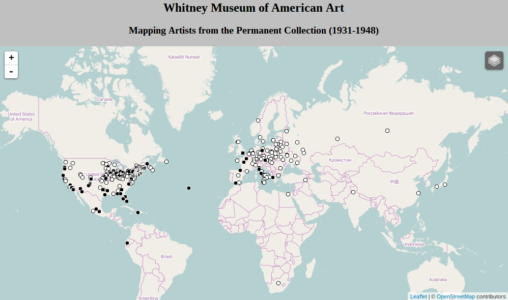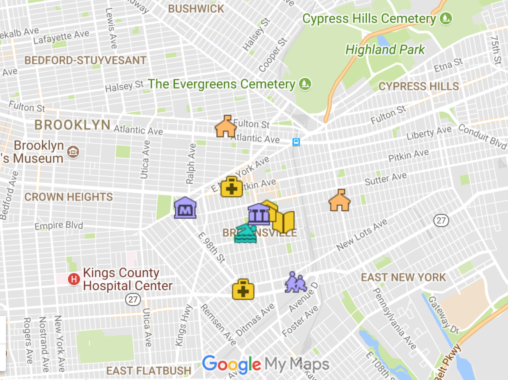Category: 2016Page 1 of 3
InfoShow – Visual Literacy in Pre-K Visual literacy is a critical skill that enables individuals to navigate the world of visual media. While the research shows multiple benefits of introducing…
Informed by targeted qualitative research as well as six years of on-the-ground personal observations, this strategic story guides viewers through the current experience of the Bronx Zoo visitor. After identifying pain points and areas for potential, a design solution is proposed in the form of a mobile app. The solution is intended not only to improve the visitor experience, but also to create a feedback channel which will allow further design improvements to be made.
By using web-scraping tools, I obtained data from fan-curated wikia pages concerning several comic book publishers. By assessing this data at several different points from 1995-2015, I sought to see if the proportion of women writers and artists in the comic book industry was increasing, if women artists and writers tend to more often work on female-fronted titles, and if that changes based on if the title is creator-owned or work-for-hire.
This project uses historical materials from the Brooklyn Collection archive on the creation of the Marcy Houses projects to explore themes of community and local history with secondary school students in the Brooklyn Connections program. By exploring current issues around housing through the lens of historical events, this group created a unit of study that engages students in culturally relevant instruction.
The “LibGuide for Film and Media Preservation” is a centralized location tool to serve the needs of beginning professionals working with and managing moving image media, analog and digital, in information environments such as archives, museum and special collections and libraries. In addition, the resource guide is designed as a supplement to graduate students taking relevant course work in library and informational science coursework, such as film and media collections. The LibGuide includes information resources including encyclopedias, dictionaries, and indexes, selected for their coverage across disciplines including varied topics as preservation, conservation and restoration, film history, and librarianship.
This instructional video teaches a craft skill using principles of instructional design and simple technology.
This instructional video uses stop animation and principals of good instructional design to teach how to fold a plastic shopping bag into a neat, small triangle.

This project reports the results of the first nine months of developing linked open data with a small selection of the Whitney’s collection, focusing on the artist and works added to the collection during the founding years (1931-1948) under its first director Juliana Force. It serves as a case study for other institutions interested in developing linked open data projects. This project also demonstrates several practical examples of how linked open data can be used for research and public outreach.
This panel explores research and recommendations in community building and engagement at three organizations: the Finkelstein Memorial Library; Pax Gaming Community; and the United States Military, Academic Library, West Point. Special emphasis is placed on social media.
This paper will address the extremely influential role of archives in identity formation processes, and will explore how this asymmetry is magnified when considering marginalized, and specifically stateless, communities. This complex relationship will be further explored as it relates to depictions of Palestinians in two unique digital archives.
Libraries around the world have been concerned with the digitization of theirmaterials for the past two decades. A digitally available global library is growing, thanks to immense projects like Google Books, and large academic libraries that have been ceaselessly digitizing their materials as new scanning and data storage technologies continue to revolutionize the field. This presents a question of a huge amount of labor—who will do it?
First, I want this paper to shine a light on the actual labor performed by book
scanners for Google, and for other, smaller, library digitization projects. Manual labor continues to drive technological advancement, whether it’s in Apple’s Chinese factories where women construct iPhones for menial pay, or in Silicon Valley where Google’s scanning team works overnight to digitize the world’s libraries.
Second, I want to reveal the ways in which this labor goes undiscussed, both as
(likely) company policy at Google, and in smaller libraries, public and private, around world. Why does this labor remain hidden? The underground sensation that surrounds the Google’s scanning labor, and the way that the transformative labor of digitization goes unremarked, gets us close to the very old class conflict that is at the center of the new tech economy.
The first section of this paper will look at artist Andrew Norman Wilson’s
findings in his art pieces dealing with Google’s book scanning operations, and what we can know about labor conditions there. I then want to connect those findings to labor in smaller digitization undertakings at academic, public, and private libraries around the country. This leads to a discussion of automated robotic book scanners, and the future of library material digitization in the burgeoning convenience economy.
“‘Data-Drive Transparency’: Creation and Consequence of the Data-Public” analyzes the impact open government data programs have on society. The paper discusses how open government data, despite being marketed as democratic transparency initiative, results in the formation of a ‘data-public’ and the ascendance of neoliberal politics.
My paper deals with social justice, diversity, and demographics in the LIS profession and its practice.
Students from this semester’s “Usability Theory & Practice” course present highlights from three client-facing usability projects – for Columbia Libraries, Pratt SAVI, and the NYC Open Data Portal – and reflect on lessons learned from their experience, from communicating with the client about the project’s scope to presenting their final analysis and recommendations directly to the client via a face-to-face presentation.

